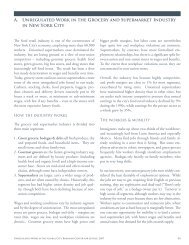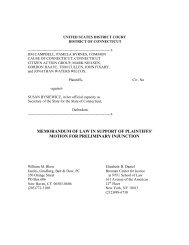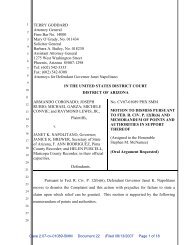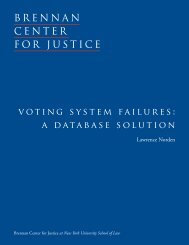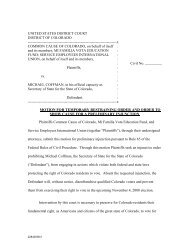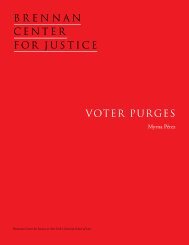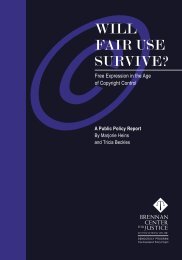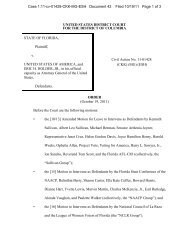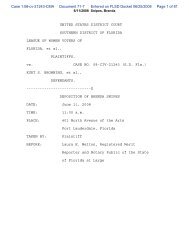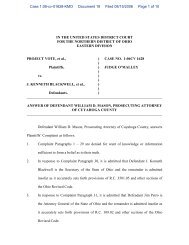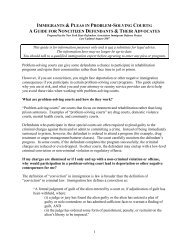Motion to Dismiss Case - Brennan Center for Justice
Motion to Dismiss Case - Brennan Center for Justice
Motion to Dismiss Case - Brennan Center for Justice
Create successful ePaper yourself
Turn your PDF publications into a flip-book with our unique Google optimized e-Paper software.
<strong>Case</strong> 2:07-cv-01089-SMM Document 48 Filed 01/22/08 Page 12 of 15<br />
1<br />
2<br />
3<br />
4<br />
5<br />
6<br />
7<br />
8<br />
9<br />
10<br />
11<br />
12<br />
13<br />
14<br />
15<br />
16<br />
17<br />
18<br />
19<br />
20<br />
21<br />
22<br />
23<br />
24<br />
25<br />
26<br />
27<br />
28<br />
motion <strong>to</strong> dismiss Count Four will be granted.<br />
E. Counts Five, Six, and Seven - Disenfranchising Persons Convicted of Non-<br />
Common Law Felonies Violates the Federal and State Constitutions<br />
The Fourteenth Amendment states that the right <strong>to</strong> vote shall not be “denied . . . or<br />
in any way abridged, except <strong>for</strong> participation in rebellion, or other crime.” U.S. Const.<br />
amend. XIV, § 2 (emphasis added). Counts Five, Six, and Seven are each based on the<br />
notion that “other crime” should be read as distinguishing between common law and noncommon<br />
law felony convictions. From that distinction, Plaintiffs claim that Arizona’s<br />
felon disenfranchisement scheme violates the Equal Protection Clause of the federal<br />
Constitution (Count Five), Arizona Constitution Article 2, § 21 (Count Six), and the<br />
privileges and immunities clauses of the federal and state constitutions (Count Seven).<br />
Defendants seek <strong>to</strong> dismiss Counts Five through Seven on the basis that no such<br />
distinction exists. (Defs.’ Mot. at 13-17.) Plaintiffs respond that legislative his<strong>to</strong>ry of the<br />
Fourteenth Amendment demonstrates that “other crime” refers only <strong>to</strong> common law<br />
felonies. 7 (Pls.’ Resp. at 21-26.)<br />
Plaintiffs’ argument finds no support in either a plain reading of § 2 or principles<br />
of statu<strong>to</strong>ry interpretation. The Court in Richardson under<strong>to</strong>ok <strong>to</strong> determine whether the<br />
relevant language of § 2—“except <strong>for</strong> participation in rebellion, or other crime”—was<br />
“intended <strong>to</strong> have a different meaning than would appear from its face.” Richardson, 418<br />
U.S. at 43. After first noting the problem of interpreting the “intention” of a<br />
constitutional provision, the Court observed that “legislative his<strong>to</strong>ry bearing on the<br />
meaning of . . . § 2 is scant indeed.” Id. Nonetheless, “this language was intended by<br />
7 Plaintiffs also assert that courts should re-examine the constitutionality of<br />
disenfranchising persons convicted of crimes because the practice has resulted in racial<br />
disparities. (Pls.’ Resp. at 27-29.) The Complaint does not contain this allegation, nor is<br />
a claim of racial discrimination stated. Moreover, the statistics offered by Plaintiffs <strong>to</strong><br />
support their assertion are not properly be<strong>for</strong>e the Court. Cf. Fed. R. Evid. 201.<br />
There<strong>for</strong>e the Court will not address Plaintiffs’ assertion.<br />
- 12 -


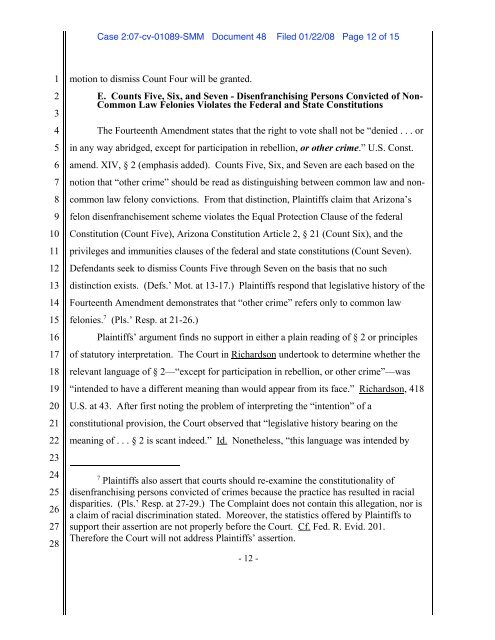
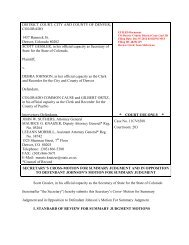
![Download the Letter [PDF] - Brennan Center for Justice](https://img.yumpu.com/50139248/1/190x245/download-the-letter-pdf-brennan-center-for-justice.jpg?quality=85)
